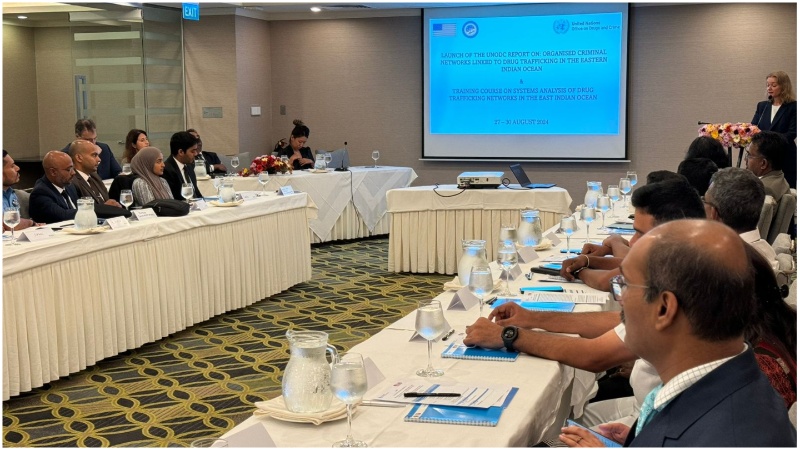Sri Lanka: Regional Roundtable and Systems Analysis Exercise on Mapping Drug Trafficking Networks in the Eastern Indian Ocean Region
Colombo, Sri Lanka/ 30 August 2024: Situated right in between the world’s two largest drug production regions, widely referred to as the Golden Triangle and the Golden Crescent, the South Asian region has continuously seen illicit trafficking of drugs on the rise.
In this context, the Global Maritime Crime Programme of the United Nations Office on Drugs and Crime (UNODC GMCP), in partnership with the Global Programme on Criminal Network Disruption (GPCD) has conducted a regional operational assessment that investigated the organised crime networks (OCNs) engaged in illicit drug trafficking in the Eastern Indian Ocean Region, with a focus on the Maldives and Sri Lanka.
The operational assessment explores the characteristics of the OCNs operating in the region, the business models being adopted by these networks, their modus operandi and the impact of opiate trafficking on security, governance and the rule of law.
In August, UNODC GMCP in close collaboration with the GPCD organized the Regional Roundtable and Systems Analysis Exercise on Mapping Drug Trafficking Networks in the Eastern Indian Ocean Region with the aim to facilitate information sharing amongst regional practitioners and experts in maritime security, based on the assessment findings.
A report titled ‘Organized Criminal Networks linked with Drugs Trafficking in the Eastern Indian Ocean Region’ compiling these findings was launched during the programme.
The programme has paved the way for a discussion whose focus was on the criminal networks involved in drug trafficking, latest trends and patterns associated with drug trafficking, the impact of the illicit drug trade in various countries and law enforcement responses.
Through this training exercise, it was expected that the national experts would develop skills to identify gaps in their investigation policies and capabilities and enhance their understanding of the ‘systems’ which underpin national and regional threats associated with drug trafficking. As a whole, UNODC GMCP anticipates that this will help them to improve their national organized crime risk assessment capabilities and national strategies to prevent and combat drug trafficking.
Over 23 representatives from the maritime law enforcement agencies and legal and administrative entities in India, Maldives and Sri Lanka took part in this event. The Secretary of the Ministry of Justice, Mr. M. N. Ranasinghe graced the opening ceremony and received the report on behalf of the Government of Sri Lanka.
This marked a milestone in UNODC GMCP’s attempts towards promoting regional cooperation and the rule of law in the Indian Ocean region. It will continue to support the Member States in enhancing their capacities to prevent and combat maritime criminal activities that threaten the overall security in the region.
This activity was funded by the United States of America and contributes to SDG 16 and SDG 17.
